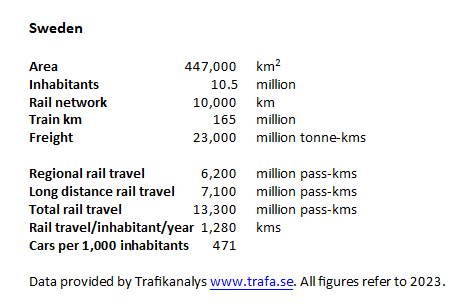This opinion piece explains the evolution of Sweden’s rail system, from a period of decline to one of successful competitive tendering. Sweden has revitalised its rail network through regional transport authorities, multi-modal ticketing, and a focus on customer needs, demonstrating that even long-distance services can often operate commercially.
In 1950-1970 there was a boom in road transport and few believed that rail had any future. Long-distance services were few and slow, and regional services were seen as having no future. Regional and local public transport was very fragmented. The turnaround came when regional transport authorities (RTAs) assumed responsibility for regional public transport in the 1970s. Competitve tendering was introduced first for bus services and gradually for commuter and regional rail services. The RTAs improved the frequency of services and started to acquire new rolling stock. Multi-modal ticketing integration was seen as absolutely essential. Low access charges also helped expand services. In 2024 about half of Sweden’s rail services (measured in passenger-kms) were tendered out.
Long distance services are expected to operate on fully commercial terms. The only services that may be regarded as passenger service obligations (PSO) are those to northern Sweden. In 2025 only three services, two to northern Sweden and one to the Danish-German border, are subsidised by the state after tendering. It is therefore possible to run almost all long-distance services on commercial terms in Sweden, a country with only 10 million inhabitants and no road congestion. Countries with 50-60 million inhabitants should be able to operate long distance services without subsidies.
RTAs can choose to operate services by bus or train. It may therefore not be correct to characterise regional rail services as PSOs.
There have of course been setbacks. The Stockholm regional service (Pendeltåg) failed in 1999. Only 75% of the contracted trains operated because of staff shortages. There have been some appeals. In a few cases the appealing bidder has won the contract. There have been cases in which the operator has not been able to pay for the maintenance of rolling stock and has had to be dismissed.
In 2024 there were several noteworthy developments in the Swedish (tendered) rail scene:
- 1. Stockholm region commuter services (Pendeltåg). MTR handed over (early) to SJ. MTR paid a 90M€ exit fine to Stockholm RTA.
- 2. Mälartåg (interregional RTA in the Mälaren region). MTR handed over (early) to Transdev. MTR paid a 40M€ exit fine.
- 3. Stockholm Metro (Tunnelbana). MTR left the contract. A new operator from 2025: Connecting Stockholm (based in UK + Singapore).
- 4. Stockholm-Luleå/Narvik. Vy did not wish to use a two-year extension clause. SJ got a 1+1 year directly awarded ‘emergency’ contract.
- 5. MTR sold MTRX (Stockholm-Göteborg commercial operations) to VR.
- 6. Öresundståg Skåne-Danmark. Vy, VR and Transdev bid. VR won from December 2025. The contract will only be for five years as new rolling stock is planned from 2030 onwards.
and…
- Almost all traffic at Stockholm Bromma airport moved to Arlanda. This may mean changes in Arlanda rail services.
- Swedish NATO membership triggered many (more or less realistic) demands for rail and road improvements.
For many years the EU has sought competitive tendering of (non-commercial) services. In Sweden this is now generally accepted. There is no intention to use the EU exception rules other than as exceptions. There is some political debate about rail tendering but this is practically nothing compared to controversies about contracted health care and schools. Public transport has largely escaped this.
Competitive tendering (of regional services) can be launched by:
- Creating a regional framework for competitive tendering. Carrying out regional consultations. Consensus is essential!
- Creating a multi-modal ticketing and information scheme.
- Deciding who will supply/own/maintain rolling stock.
- Deciding on the design and size of contracts. Sweden offers no real advice but in Germany five million train-kms a year have been mentioned as a minimum.
- Beware of very low bids.
- Prepare for problems, for instance, an operator failing
Competition is good for us – the Lisbon treaty states that a market economy is a condition for being a member state.

This opinion piece by Bertil Hylén, a former analyst at VTI Transport Research, originally appeared in the European Transport Regulation Observer, “Tendering railway public service obligation contracts: a balance sheet” (January 2025).




